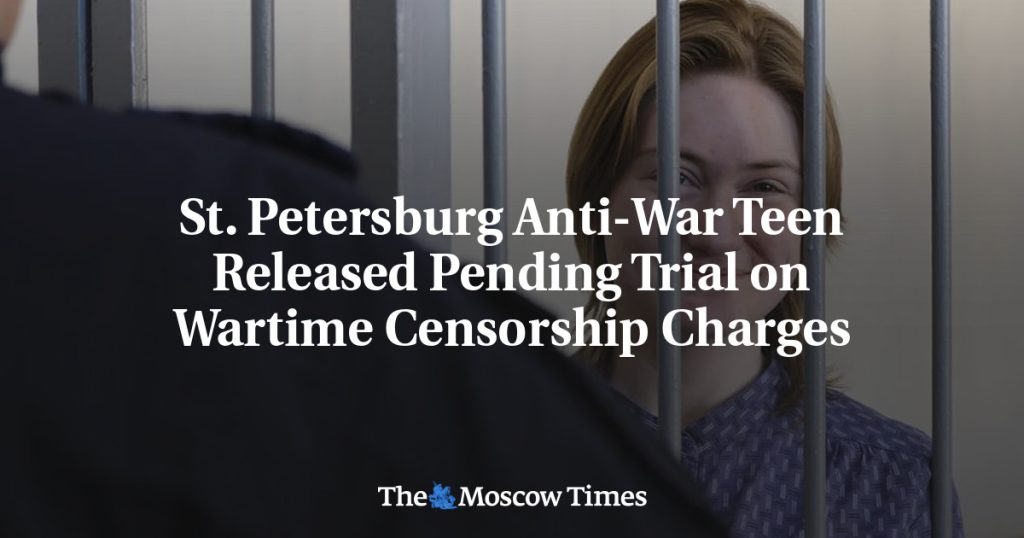A Young Activist’s Struggle for Freedom of Expression in Russia
Introduction: The Case of Daria Kozyreva
In a recent development that has drawn significant attention to the challenges faced by activists in Russia, a court in St. Petersburg released 19-year-old anti-war activist Daria Kozyreva from pretrial detention on Friday. While her release brings a measure of relief, Kozyreva is far from free. She remains under strict restrictions as she awaits trial on charges of “discrediting” the Russian military. If convicted, she faces up to five years in prison. The case has highlighted the growing clampdown on dissent in Russia, where even young voices like Kozyreva’s are being silenced for speaking out against the war in Ukraine.
The Arrest and Charges Against Daria Kozyreva
Kozyreva’s troubles with the authorities began in February 2022, when she was arrested for her anti-war activism. On the second anniversary of Russia’s full-scale invasion of Ukraine, she attached a poem by the celebrated Ukrainian writer Taras Shevchenko to a monument of the poet in St. Petersburg. This act of dissent led to her being charged with “repeatedly discrediting” the Russian military. The charges are part of a broader crackdown on anti-war dissent in Russia, where voicing opposition to the war can lead to severe legal consequences. In December, a judge returned her case to prosecutors, citing procedural errors, but Kozyreva’s ordeal is far from over.
The Restrictions and Implications of Her Release
While Kozyreva’s release from pretrial detention is a positive step, the conditions of her release are stringent. She is banned from leaving her home at night, using the internet, or speaking to the press until December 2. These restrictions not only limit her freedom but also effectively gag her from expressing her views or continuing her activism. The move is seen as an attempt to silence her and prevent her from gaining further public sympathy or attention. The strict measures highlight the lengths to which Russian authorities are willing to go to suppress dissent, even from young individuals like Kozyreva.
A History of Activism and Repression
This is not Kozyreva’s first brush with the law for her anti-war stance. In 2023, she was fined 30,000 rubles ($341) for an anti-war post on social media and expelled from her university. Her activism has come at a significant personal cost, but she has continued to speak out against the war and its impact on Ukraine. In 2022, she was arrested again for writing a critical message on an installation symbolizing the “brotherhood” between St. Petersburg and Mariupol, a Ukrainian city devastated by Russian forces. Her actions have made her a target of the authorities, who seem determined to stop her from expressing her views.
The Wider Context of Censorship in Russia
Kozyreva’s case is part of a larger pattern of censorship and repression in Russia, where the government is increasingly cracking down on dissent. Independent media outlets and journalists are facing unprecedented challenges, with many being labeled as “foreign agents” or “undesirable organizations.” The Moscow Times, an independent English-language newspaper, has been designated as an “undesirable” organization by the Prosecutor General’s Office, criminalizing its work and putting its staff at risk of prosecution. The outlet, which has been a source of unbiased reporting on Russia, has been accused of “discrediting the decisions of the Russian leadership,” a charge it vehemently denies. Journalists at The Moscow Times refuse to be silenced and are asking for public support to continue their work.
The Fight for Independent Journalism in Russia
In the face of these challenges, independent journalism in Russia is under serious threat. The Moscow Times has been unfairly labeled as a “foreign agent” and now an “undesirable” organization, making it difficult for the outlet to operate freely. Despite these obstacles, the journalists at The Moscow Times remain committed to providing accurate and unbiased reporting on Russia. They are urging readers to support their work, whether through monthly contributions or simply by spreading the word. The outlet’s struggle is not just about journalism; it is about defending the principles of free speech and democracy in a country where these values are under constant attack.
Conclusion: The Broader Implications of Kozyreva’s Case
Daria Kozyreva’s case is a stark reminder of the high cost of dissent in Russia today. Her release from pretrial detention, while a positive development, does not-mean she is out of danger. The charges against her and the strict conditions of her release highlight the lengths to which the Russian authorities are willing to go to silence critics of the war in Ukraine. At the same time, the challenges faced by independent media outlets like The Moscow Times underscore the broader struggle for freedom of expression in Russia. As long as voices like Kozyreva’s are being silenced, the fight for justice and accountability in Russia will continue.












